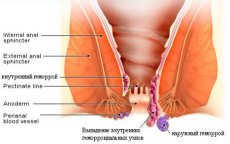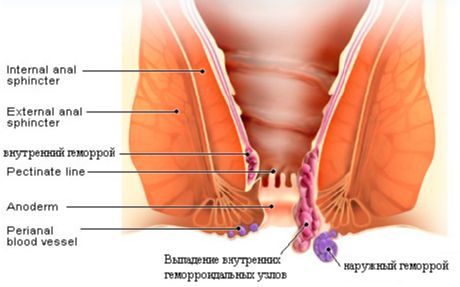Medical expert of the article
New publications
Causes of hemorrhoids: controlled and uncontrolled risk factors
Last reviewed: 04.07.2025

All iLive content is medically reviewed or fact checked to ensure as much factual accuracy as possible.
We have strict sourcing guidelines and only link to reputable media sites, academic research institutions and, whenever possible, medically peer reviewed studies. Note that the numbers in parentheses ([1], [2], etc.) are clickable links to these studies.
If you feel that any of our content is inaccurate, out-of-date, or otherwise questionable, please select it and press Ctrl + Enter.

Why do people get hemorrhoids? What are the causes of hemorrhoids? Research shows that hemorrhoids are caused by several underlying causes, including increased pressure on the rectum and anal veins, which occurs over time. This is why people in their 50s and older may experience hemorrhoids more often than someone in their 20s.
What can cause hemorrhoids?
Hemorrhoids can be caused by digestive problems such as diarrhea and constipation. Usually, people also have a poor diet, with very low fiber intake. Even obesity can have a significant impact on hemorrhoids and their development. Sometimes, if people lift heavy objects or play rough sports, they can develop the risk of hemorrhoidal cones. Pregnancy, hypertension, and other health-related circumstances can be decisive factors in the occurrence and development of hemorrhoids.
What are the causes of hemorrhoids?
Doctors do not know why hemorrhoids enlarge. There are several theories about the causes of hemorrhoids, including insufficient fiber intake, prolonged sitting on the toilet, and chronic straining to have a bowel movement (constipation). None of these theories has strong experimental support. Pregnancy is the most common cause of hemorrhoids, although again, this cause is unclear. Tumors in the pelvis also cause the hemorrhoid area to enlarge, compressing the veins upward away from the anal canal.
Another theory suggests that hard stools influence the development of hemorrhoids, passing through the anal canal, pulling the hemorrhoidal cones downwards. Another theory suggests that with age or aggravating circumstances, the supporting tissues responsible for fixing the underlying muscles of the anal canal are destroyed and weakened. Accordingly, the hemorrhoidal tissues lose their fixation and slide downwards, into the anal canal.
Muscle compression
Another physiological fact that is known about the development of hemorrhoids is that the pressure on the anal sphincter increases because the muscles that surround the anal canal weaken, hemorrhoids occur. The anal sphincter is the muscle that allows us to control bowel movements, especially during defecation.
It is not known, however, whether this increased pressure precedes the development of hemorrhoids or is a result of hemorrhoids. It may be that during bowel movements, it is necessary to increase the squeezing force to force the stool through the sphincter ring. Increased bowel straining may worsen hemorrhoids and the development of lumps in the anus.
What are other causes of hemorrhoids?
The exact cause of hemorrhoids is unknown, however, the upright position of people at rest places more pressure on the rectal veins, sometimes causing them to bulge. Other factors that cause hemorrhoids include
- Aging
- Chronic constipation or diarrhea
- Pregnancy
- Heredity
- Too much straining during bowel movements
- Bowel dysfunction due to excessive use of laxatives and enemas
- Defecating for long periods of time (eg reading on the toilet)
Whatever the cause, hemorrhoids stretch the tissues that support the vessels. As a result, the vessels dilate, their walls become thin and bleed. If the stretching and pressure continue, the weakened tissues of the rectum come out.
More about the circumstances that cause hemorrhoids
Heredity – Hemorrhoids can be a hereditary condition, especially if your family members have weak veins, which can lead to the development of hemorrhoids and varicose veins.
Age - the main muscles of the anal canal weaken with age and deteriorate, losing their ability to hold the anus tight. As a result, hemorrhoidal tissues slide down into the anal canal, developing hemorrhoids.
Low fiber diet - An unhealthy diet is listed as a possible cause of hemorrhoids, also because such a diet can cause constipation. When you have to strain to have a bowel movement, you cause increased pressure on the rectum and anus, causing bloating and veins in these areas. Studies have shown that in less developed African countries where the diet consists of high levels of fiber foods, cases of hemorrhoids are rare. Countries that have a Western-style diet of fast food report more cases of hemorrhoids.
Spending a lot of time on the toilet - have you noticed that the modern toilet has become more comfortable, so that people would like to spend more time on it? Check out most people's bathrooms and you will see newspapers and magazines in the toilet! Sitting on the toilet like a throne can cause unnecessary strain on the anus, adding pressure to the anal veins and dilating blood vessels. This provokes hemorrhoids.
Anal sex - there are doctors who believe that anal sex, whether heterosexual or homosexual, is listed as a possible cause of hemorrhoids due to the pressure on the rectum and anus. Recent studies have shown that homosexual men have more cases of hemorrhoids than heterosexual men.
Diarrhea and excessive use of laxatives and enemas are also considered possible causes of hemorrhoids because they involve increased pressure on the rectum and anal veins.
Pregnancy - is also considered a possible cause of hemorrhoids due to the increased pressure on the rectum and anus caused by the growing baby.
Pelvic tumors - hemorrhoids can also become enlarged due to tumors in the pelvic organs, which can put pressure on the veins that run from the anal canal.

Sedentary lifestyle - sitting or standing for long periods of time can put pressure on the rectum and anus, increasing the risk of developing hemorrhoids.
Causes of Hemorrhoids That Are Difficult to Control
Genetics
Among all the causes of hemorrhoids, genetic predisposition is the most difficult factor to control. Some people are born with weaker veins, the walls of their blood vessels are more sensitive to internal or external pressure. When the pressure around the anal blood vessels increases due to deformation and hard stool, the veins become larger, and this increases the risk of blood clots forming in the vessel, leading to the development of hemorrhoidal cones.
Obesity
Another major cause of hemorrhoids that is difficult to control is obesity. Patients who are overweight add a lot of extra weight to the circulatory system, and this is aggravated every time a person stands up or even just goes for a walk. This extra weight puts undue pressure on the anal area, especially when a person sits. In fact, obese patients may unknowingly aggravate existing hemorrhoids by sitting for long periods of time.
Pregnancy
A similar mechanism that causes difficulties in controlling hemorrhoids is the condition of pregnant women, when the body has to cope with carrying the extra load, especially in the last trimester of pregnancy and the extreme pressure during labor. As mentioned earlier, pregnancy as a cause of hemorrhoids is a trigger for it, and it is really difficult to avoid hemorrhoids for women who are about to give birth.
Intermittent or chronic hemorrhoids can cause very unpleasant symptoms in pregnant women - severe pain, bleeding and itching or burning and a great deal of discomfort, making pregnancy even more difficult.
Constipation
Constipation is often cited as the main trigger for hemorrhoids, but the truth is that it is a digestive imbalance that is really hard to control. People who suffer from chronic constipation tend to have straining stools, which causes increased pressure on the rectum, straining the blood vessels.
On the other hand, laxatives used by patients to treat constipation can generate diarrhea, which in turn can lead to damaged veins and swollen, painful hemorrhoids. So for these patients, the question is not how he gets hemorrhoids, but what he can do to avoid them. And the answer is quite simple: change your diet and make healthier choices. If you want to get rid of pain and discomfort, take care of your health.
What makes hemorrhoids worse?
- Bad toilet habits, such as sitting incorrectly on the toilet seat or wiping with paper that is too rough, can also cause hemorrhoids.
- Loss of tissue elasticity associated with aging is a common cause of hemorrhoids in older adults.
- Additionally, these and other causes of hemorrhoids include anal sex with or without special lubricants
- Severe liver disease.
Bowel movements, physical and emotional stress, and other factors can increase your risk of developing hemorrhoids or make existing hemorrhoids worse. Some of these factors can be prevented with the help of a doctor.


 [
[